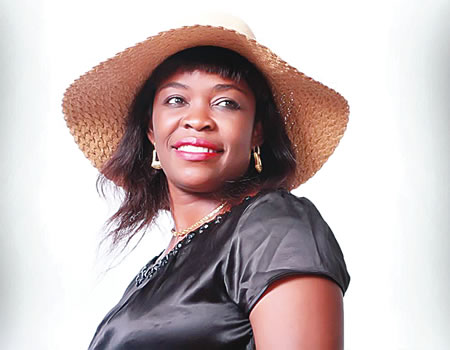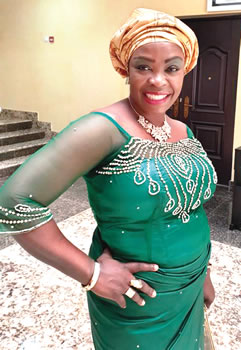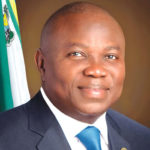What informed your choice of Geology as the course of study?
I wanted to study Medicine. I picked Medicine as my first choice and Pharmacy as my second choice. My cut off mark was lower than the cut off for Medicine so I was asked to go for another course in the sciences. I was given Pharmacy but I found out that you cannot change your department after the first year, so, I opted for Geology. After my first year, I worked hard and met the minimum GPA for admission into Medicine and the department accepted me but my own department did not release me. This was because we were less than twenty in my set and there were only six ladies, people had no interest in studying Geology. I give glory to God that I was not allowed to change my course because I believe that going to that department was for a purpose. I actually met the love of my life in that faculty and department.
You worked at a quarry for sixteen years, what were the challenges you faced, especially being a woman?
It was not easy being a woman in a male-dominated field. I would have risen higher than what I attained before I left the company if I had been a man. I was denied a lot of opportunities because I am a woman but I didn’t relent in my effort.
When I was sent to the quarry, I was the only woman in the midst of about forty-five men. I worked hard enough and my boss was impressed that he employed me immediately after the mandatory NYSC programme. It was thus very interesting, even right from school, everyone was viewed as men. When we go for field work, we were put in the same room with men. So, that prepared me to work with men.
It is necessary to know your onions, that will prepare you as a woman to stand out in a world of men. Some people believe that women should only be in the kitchen or in the home but I believe that God has placed the same potentials. He put in men in women too.
When I was pregnant with my first baby, I had to deal with morning sickness and other symptoms of childbearing. The company must have felt that if I were a man, I wouldn’t have had to take the maternity leave that I took. By the time I was back on my feet, I fitted in properly again.
Throughout my stay in the company, I was not given an opportunity to go on leave because the company saw the need for me to always be on the seat. The only time I had to go on leave was when I went on maternity leave. I have three children; I went to the hospital from work to deliver the first two.
I had an understanding boss and that really helped me. You know, society feels that the woman is a second-class citizen but we thank God that a few of our leaders have chosen to promote the female gender. I will always appreciate the former president of the country, Dr Goodluck Ebele Jonathan and his wife, who decided to encourage women and gave them a voice by putting them in positions of authority.
How were you able to combine the home front with your career?
That was another challenge, but like I said, it depends on individuals. Personally, I resume work at 8.00am and close by 6.00 pm. I make sure I get up early enough to put things in order before setting out in the morning and most times, we all move out together.
I planned my schedule in such a way that one does not affect the other. Some women put things in the freezer, I don’t do that, I believe in eating fresh food. In fact, for a long time, I never had a freezer in my house because I didn’t want to be tempted to keep things there. So, I cook everyday but I have an understanding husband who understands my work life and patterned his life accordingly.
My children are my best friends, I have boys and they understand that I am a working mother. Now that they are grown up, we all get involved in house chores and cooking. So, I never had issues with balancing the home front with my career. I have been able to balance and prioritise. One does not suffer for the other neither does one affect the other.
At what point did you decide to go into politics and what motivated you to do so?
After my fifteenth year at work, I was already having a thought of going into a different sphere of life. From my NYSC, I started working with the company and it was just work and home, so I felt I needed a different kind of routine. I was praying and was seeking for direction.
I got involved in a few businesses, though I knew that I didn’t like buying and selling. I felt it would be an alternative to work, I was trying to see how I could combine that with work. I also enrolled in the Institute of Stockbrokers; I was on the final stage of the examination and was just looking for a way out of my basic rudimentary life.
I got the directive that I should go into politics, so I got acquainted with my ward. I had to go to my village, to meet my people and that was how it all started. Getting to study politics and the lives of our politicians, the life of our governor, Dr Peter Ayodele Fayose, actually motivated me. I saw him as a young man who tried his best to make an impact and make a difference in the society, to give back to the people, and that was a great encouragement for me.
Also the fact that we have left governance in the hands of people who are not interested about giving back to the society, was another motivation for me. Some of us who are Christians are not getting involved in governance because we feel it is for a set of people.
When we pray that God should give us good leaders but we don’t get involved, God will eventually give us bad leaders and we will be back to square one. So, I got encouraged that as believers, we can get involved and make a difference.
How has the journey been since you got into office?
They are two different worlds; where I came from is the private sector, where I am now is the public sector. The private sector is private business, things are done with haste and diligence and that helped me. This is a world where things are done with protocols and things move from one level to another.
A file that can be treated right now will be dragged on and go from one table to another. Initially, I saw it as a waste of time and delayed processes but I later realised that it was the due process and the file needs to gather the appropriate signature for control purposes.
In the private sector, it passes from only one or two officers to the Managing Director. The slow pace has its own advantage and disadvantage as well, I am grateful to the governor because out of nowhere, he picked me to occupy this office. Since the time I assumed office, we have started a lot of projects; dualisation of roads, fixing of street lights in 10 local governments, we have a flyover constructed and we commissioned, the new government office, the veterinary clinic and so many other projects that kicked off when I assumed office.
I was alert to my responsibilities and I was able to meet up with the challenge. I realised that to make an impact, you must stay on top of your game, I am always on the field from the commencement of projects. Nobody told me the story, I was part of the job, I learnt a lot on the job as well. I asked questions from the contractors and I ensured things were done to specifications.
What advice do you have for women out there?
There is a norm that when a woman has not given birth to a male child, she has not given birth. Every child matters, and is worthy of being treated equally. Let us train our girls properly. Seats that men would not be able to occupy can be occupied by female. Let’s encourage our girls, there is no course that a female child cannot do, we must give the female child the opportunity to exploit the gifts they have.
I always tell people that the female gender is better gifted, since she is an improvement upon the man. We are better organisers and as such we are important. Female children should not be deprived of their right and as women, we must not see ourselves only as kitchen materials. We have been given the opportunity to contribute our quota and as such we should take our chances.







